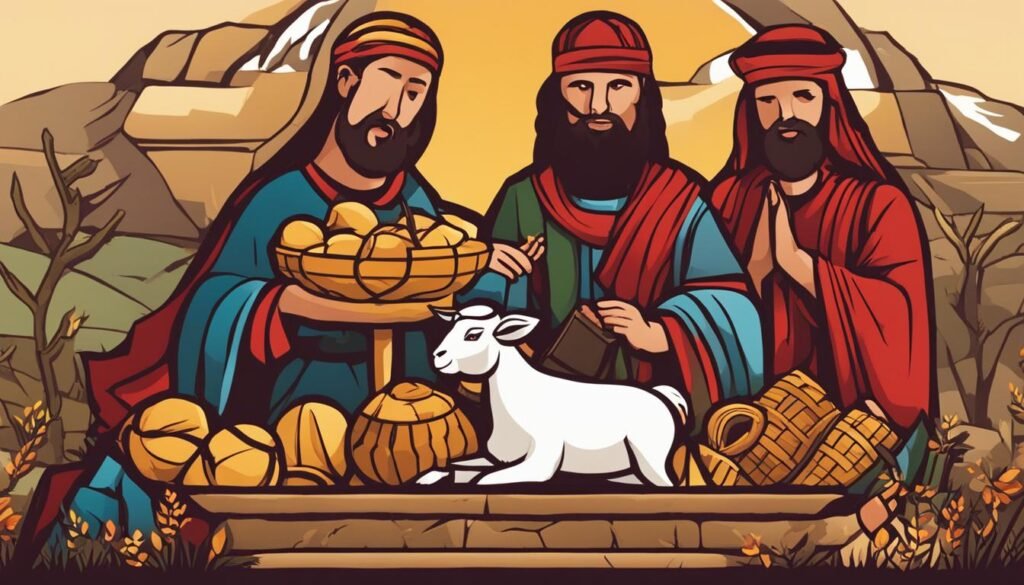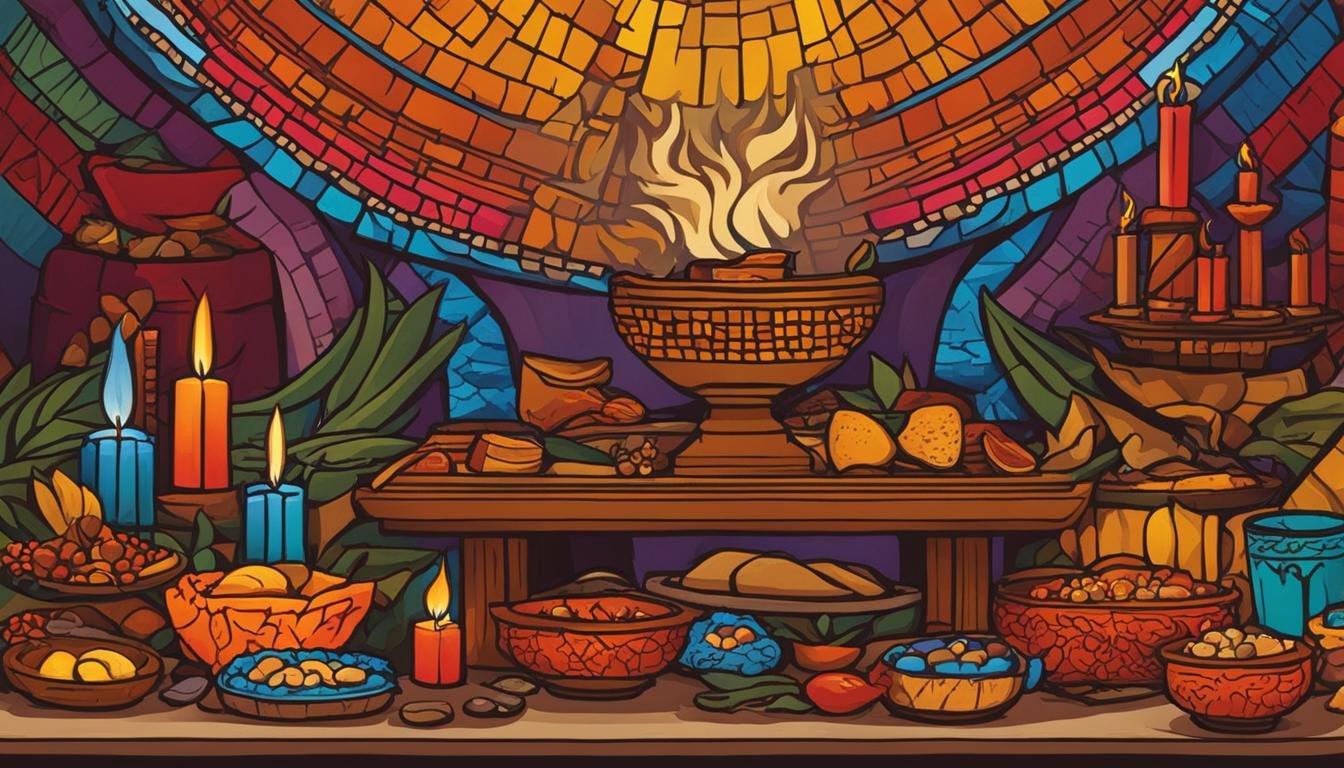The Bible speaks of several different sacrifices that God expected of Israel on a regular basis. There are five types of sacrifices mentioned in the Bible: the burnt offering, the grain offering, the peace offering, the sin offering, and the trespass offering. Each sacrifice served a specific purpose and function. The burnt, grain, and peace offerings were voluntary, while the sin and trespass offerings were mandatory. These sacrifices involved specific elements such as animals or fruit/grain and had different rituals associated with them. The sacrifices in the Bible were a way for Israel to seek atonement for their sins and express their devotion and worship to God.
Key Takeaways
- There are five types of sacrifices mentioned in the Bible: burnt offering, grain offering, peace offering, sin offering, and trespass offering.
- The burnt, grain, and peace offerings were voluntary, while the sin and trespass offerings were mandatory.
- Each sacrifice served a specific purpose and involved different elements and rituals.
- The sacrifices in the Bible were a way for Israel to seek atonement for their sins and express their devotion to God.
- These sacrifices are a significant part of Israel’s worship and relationship with God.
The Significance of Each Type of Sacrifice
The sacrifices mentioned in the Bible hold great spiritual significance, each serving a specific purpose in the act of worship and atonement. Understanding the meaning behind each type of sacrifice provides deeper insight into the relationship between God and His people.
The Burnt Offering
The burnt offering was a voluntary act of worship, symbolizing complete surrender and dedication to God. It served as a means of atonement for unintentional sins. Animals such as bulls, birds, or rams without blemish were offered, and the entire animal was burned on the altar, ascending as a pleasing aroma to God.
The Grain Offering
The grain offering expressed gratitude and thanksgiving to God for His provision. It consisted of fine flour, oil, and salt, with a portion burned on the altar as an offering. This offering recognized God’s faithfulness and generosity, acknowledging that all blessings come from Him.
The Peace Offering
The peace offering was a sacrifice of thanksgiving and fellowship with God. It involved unblemished animals and various grain and bread offerings. After the ritual, the worshippers and the priests shared a communal meal, symbolizing the harmony and joy of a restored relationship with God and fellow believers.
The Sin Offering
The sin offering was mandatory and served to atone for sins and cleanse individuals from defilement. The type of offering varied depending on the person’s financial situation. The fat portions were symbolically burned on the altar, while the remainder was consumed by the priests. This sacrifice highlighted the seriousness of sin and the need for forgiveness and restoration.
The Trespass Offering
The trespass offering was also mandatory, specifically dealing with unintentional sins committed against others. It required restitution and recompense to the wronged party, emphasizing the importance of making amends and seeking reconciliation. The ram offered as a sacrifice was shared between the priests and the person making the offering, signifying the restoration of both the relationship with God and with others.
The significance of these sacrifices lies in their ability to deepen the worshipper’s understanding of God’s holiness, grace, and mercy. While they were essential in the Old Testament era, they also foreshadowed the ultimate sacrifice of Jesus Christ, which fulfilled their purpose completely.

| Type of Sacrifice | Significance |
|---|---|
| Burnt Offering | Complete surrender and dedication to God |
| Grain Offering | Thanksgiving for God’s provision |
| Peace Offering | Thanksgiving and fellowship with God and fellow believers |
| Sin Offering | Atonement for sins and cleansing from defilement |
| Trespass Offering | Reconciliation and restitution for unintentional sins against others |
The Meaning of Sacrifices in the New Era
The sacrifices in the Old Testament were an integral part of Israel’s relationship with God, pointing forward to the ultimate sacrifice of Jesus Christ in the New Testament. Jesus, as the ultimate sacrifice, fulfilled the purpose and meaning behind the Old Testament sacrifices. His sacrificial death on the cross became the atonement for our sins, offering redemption and reconciliation with God.
Unlike the animal sacrifices in the Old Testament, Jesus’ sacrifice was perfect and eternal. It provided a way for humanity to be forgiven and restored to a right relationship with God. As a result, believers in Jesus no longer need to offer animal sacrifices for atonement. Instead, they are called to offer themselves as living sacrifices, dedicating their entire being to God’s service.
This new era of sacrifice emphasizes a life of devotion, worship, and obedience to God. It is not about external rituals or offerings but about the transformation of the heart and a sincere desire to follow God’s will. As Jesus taught, true worship is not confined to a particular place or ritual, but is characterized by a genuine love for God and others.
Today, sacrifices in the New Testament era take on a different form. They involve living out the teachings of Jesus, spreading the message of His love and salvation, and serving others selflessly. Sacrifices are no longer about appeasing God’s wrath, but about responding to His grace and extending His love to others. Jesus’ sacrifice serves as a powerful reminder of the depth of God’s love and the call to live sacrificially for His kingdom.
FAQ
What are the different types of sacrifices mentioned in the Bible?
The different types of sacrifices mentioned in the Bible are the burnt offering, the grain offering, the peace offering, the sin offering, and the trespass offering.
What was the purpose of each type of sacrifice?
Each type of sacrifice served a specific purpose. The burnt offering was an act of worship and atonement for unintentional sin. The grain offering expressed gratitude and thanksgiving. The peace offering was a sacrifice of thanksgiving and fellowship. The sin offering atoned for sins and cleansed from defilement. The trespass offering specifically dealt with unintentional sins against others.
Were all the sacrifices in the Bible voluntary?
No, not all the sacrifices in the Bible were voluntary. The burnt, grain, and peace offerings were voluntary, while the sin and trespass offerings were mandatory.
What were the elements involved in the sacrifices?
The elements involved in the sacrifices varied depending on the type of offering. Animals such as bulls, birds, and rams without blemish were sacrificed. For grain offerings, fine flour, oil, and salt were used. Various grain and bread offerings were also involved in the peace offering.
What happened to the offerings during the sacrifices?
During the sacrifices, different rituals were performed with the offerings. The entire animal of the burnt offering was burnt on the altar. A portion of the grain offering was burned on the altar, while the rest was shared among the priests. The peace offering involved a shared meal after the sacrifice. The sin offering had certain portions burned as an offering to God. The trespass offering included portions offered to God and the remainder eaten by the person making the sacrifice.
What is the significance of the sacrifices in the Old Testament?
The sacrifices in the Old Testament pointed forward to the perfect and final sacrifice of Jesus Christ. They represented seeking atonement for sins, expressing devotion and worship to God, and seeking fellowship and reconciliation with Him and others.
How do the sacrifices in the Old Testament relate to Jesus?
The sacrifices in the Old Testament were a shadow of what was to come. Jesus’ sacrificial death on the cross fulfilled the purpose of the Old Testament sacrifices. He became the ultimate atonement for our sins, and as believers in Him, we no longer need to offer animal sacrifices for atonement.
What is the call for believers in regards to sacrifices?
As believers in Jesus, we are called to offer ourselves as living sacrifices. Instead of animal sacrifices, we are to present our whole being to God as an act of worship. This involves living in devotion and obedience to God and seeking to do justice, love kindness, and walk humbly with Him.

I’m Benjamin, a passionate spiritual seeker and creator of Verses and Prayers. Alongside my girlfriend Emma and our pet lizard Mulle, I cherish family life, enjoy exploring new places, and am deeply involved in my church community. My love for reading and singing biblical verses inspires every aspect of my journey.

